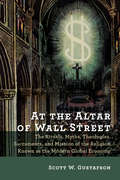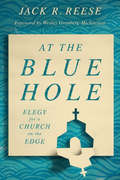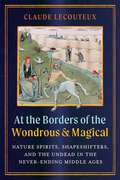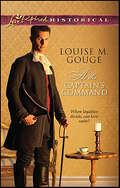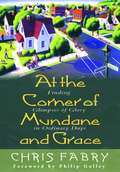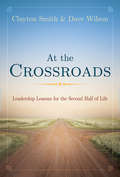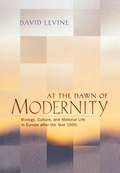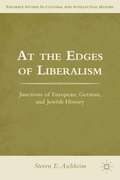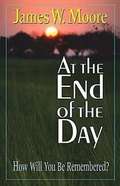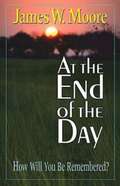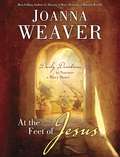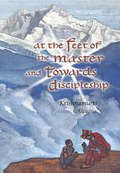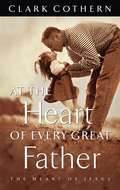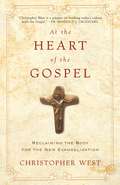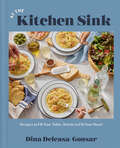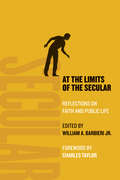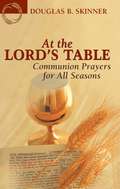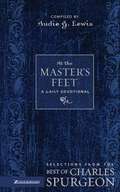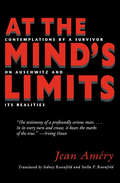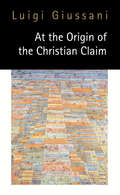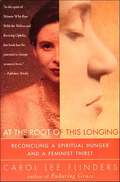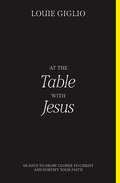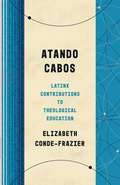- Table View
- List View
At the Altar of Wall Street: The Rituals, Myths, Theologies, Sacraments, and Mission of the Religion Known as the Modern Global Economy
by Scott W. GustafsonShows how economics functions as the dominant religion in America today In this provocative book Scott Gustafson argues that economics functions in our current global culture as religions have functioned in other cultures. He describes and analyzes the rituals, pilgrimage sites, myths, prophets, sacraments, and mission of Economics to show how the Economy is our de facto God. Discussing such topics as debt, economic terrorism, globalization, and money as the Economy's sacrament, Gustafson's At the Altar of Wall Street encompasses a broad sweep of history, philosophy, culture studies, economic ideas, and religion in its trenchant analysis.
At the Blue Hole: Elegy for a Church on the Edge
by Jack R. Reese&“Said plainly, churches are in trouble. All churches are, but certainly Churches of Christ. Whether or not they recognize the threats they are facing is a different matter. The future is fraught with dangers. Many won&’t make it.&” On New Year&’s weekend, 1831–32, two churches came together in Lexington, Kentucky, in what is often known today as the Restoration Movement. Among the churches that emerged from this movement were Churches of Christ, which grew in the nineteenth century and then flourished in the twentieth. At their zenith, around 1990, there were over 13,000 Church of Christ congregations in the United States with nearly 1.3 million members. Especially in the southern states where Churches of Christ were concentrated, it seemed inconceivable that they would ever face their own death.Like many communities of faith, these churches are now in rapid decline. The numbers are devastating. At the current trajectory, Churches of Christ in America, with a membership of just over a million, will be less than a quarter their current size in thirty years. As they awaken to their crisis, many of them are beginning to see themselves at the edge.This book is an elegy for those churches. But it is also a story of hope and promise. As from the &“Blue Hole&”—the tiny, hidden spring from which flows the San Antonio River, near where Jack Reese ministers—there is still abundant life and grace to be found flowing into Churches of Christ, waiting to be uncovered. Anyone wondering how to stem the seemingly inevitable ebb of the fading Western church will find solace and help in Reese&’s account of a once-thriving fellowship of churches that, God willing, may yet emerge from the grave into the light of resurrection.
At the Borders of the Wondrous and Magical: Nature Spirits, Shapeshifters, and the Undead in the Never-Ending Middle Ages
by Claude Lecouteux• Examines the esoteric side of texts and tales from the Middle Ages, including the enduring presence of haunted areas and power places and the roles of witches, house spirits, rune priests, shapeshifters, and the undead• Discusses the dividing line between magic and deviltry, as well as the significance of grimoires, bells, blacksmiths, storm callers, and more• Serves as a guide to a still-present magical and imaginal realm, pointing readers to the borderlands and liminal thresholds that enable access to the other worldIn this new collection of his writings, scholar and Sorbonne professor Claude Lecouteux reveals that the magical world of the distant past is real and still very present—if you know where to look. Explaining how he makes the texts he studies reveal their hidden teachings, Lecouteux directly explores the esoteric side of medieval myths and tales, peeling back the Christian veneer to show the enduring presence of haunted areas and power places, witches, house spirits, rune carvers, vampires, shapeshifters, and the undead.In tales originating from Greenland and Iceland to Saxony, Romania, and beyond, the author discusses the dividing line between magic and diablerie as well as the significance of grimoires, bells, blacksmiths, and other magical objects and characters. He explores magic in the elements of nature and as illustrated by the art of witches and magicians specializing in weather magic—storm callers and storm dispellers. He examines the medieval mythology surrounding clouds and the mythic significance of mountains in the haunted world of our ancestors, which is still as close to us today as it was to them in the past. Looking at borderlands and liminal thresholds that can serve as gateways to other worlds, the author also discusses land spirits and the rituals needed to engage with them, recognizing how their ownership of the land can never fully be usurped.Through these writings Lecouteux acts as a ferryman, transporting readers into the realms of the wondrous and magical. He enables us to see how the haunted magic of the Middle Ages never ended and how the imaginal realm, standing just beyond the borders of our own, is as vividly real as the material world.
At the Captain's Command
by Louise M. GougeDuty and career-Captain Thomas Moberly of His Majesty's Navy prizes them above all. So why is he tempted to relinquish both for Dinah Templeton? Though Dinah seems sweet and charming, the difference in station between an East Florida belle and the son of an earl is too marked to ignore. And all other obstacles pale with the discovery that Dinah's brother James is not what he seems....A war is brewing on the colonies' horizon, and James has chosen his side-in opposition to the country Thomas has sworn to defend. But what of Dinah? Where does her heart truly lie-with her family, or with the man she claims to love?
At the Corner of Mundane and Grace: Finding Glimpses of Glory in Ordinary Days
by Christopher H. FabryEveryone yearns for the mountaintop. We search for the conference that will (God willing) be life-changing. The moment when everything in our lives will neatly come together. (It could happen.) Yet daily experience teaches us that we don't -- and probably never could -- permanently live at such heights. The opposite is also true. Tragedies touch our lives every now and then. When they do we hold on to God with all our might -- because He's the only thing that's real to us in those times. But just like life at the heights, life in "the pit" is not the norm.The truth is, most of life is lived somewhere between Mt. Everest and the Grand Canyon. We reside at the corner of Mundane and Grace. The bad news? It gets boring and a little tough to keep going. The good news? That's exactly where God wants you. With light-hearted humor, gentle encouragement, and a healthy dose of wisdom and insight, Chris Fabry reveals the beauty in where you are today -- encouraging you to step forward in faith and to encounter God as you have never before At the Corner of Mundane and Grace.You will laugh, cry, and pray as Chris Fabry takes you to the corner of Mundane and Grace. He writes with wonderful, penetrating, down-to-earth insights into both human foibles and the wonders of God's grace. At the corner of Mundane and Grace you will see God in your life in the most marvelous ways.--Charles W. Colson, Prison Fellowship MinistriesIf your life is rather ordinary, this book will lead you to the extraordinary stuff that God has hidden in your daily routines.--Joseph M. Stowell, President, Moody Bible InstituteA big problem in our Christian faith is that we think God is with us only in the pew, when we're spit-shined and all tucked in. Chris Fabry tells us otherwise -- that God is with us when we're elbow-deep in dirty diapers, when our marriages are faltering, when the kids are sick and the dog is dying.--Philip Gulley, Author, Front Porch TalesWarm, witty, winsome! This happy volume will have a special place in my heart and in my home. I predict that others who taste and feast will be delighted and nourished as I have been.--Adrian Rogers, Pastor, Bellevue Baptist ChurchFrom the Hardcover edition.
At the Crossroads: Leadership Lessons for the Second Half of Life
by Dave Wilson Clayton L. SmithRetirement can be the most purpose-filled, satisfying, fun phase of your life!Thousands of men and women are retiring each day, and many look forward to this phase of life with equal parts excitement and anxiety. Baby boomers have high expectations of retirement: they want to be redeployed to a life that is meaningful, significant, and full of joy. But this requires thoughtful planning, and many soon-to-be retirees wonder how they’ll get there, or if they’re even on the right path. At the Crossroads, by Clayton Smith and Dave Wilson, is a six-week Bible-based study offering comprehensive, practical help for Christians who are approaching, entering, or already in retirement. Readers can work through the book on their own or as part of a group. The book guides readers through a study and reflection process to discover their purpose, passion, and mission for retirement. It includes self-assessments and other planning tools to help readers develop a personal and spiritual mission statement. The book also facilitates discussions with family and friends about shared priorities, expectations, and end-of-life decisions, bringing a sense of peace for all involved. Finally, the book includes a chapter on financial planning, with a focus on the reader’s legacy, for an impact that will last through generations."Most churches do too little to reach people who are nearing or entering retirement. Case in point: the baby boomer generation, which is slipping away from the church. At the Crossroads is a gift for people in this group—and for church leaders seeking to nurture them. It offers a way for retirees to reclaim God’s purpose for their lives and to serve as never before. This is powerful for the individual and for the church! Pastors should use this as the basis for preretirement classes. It is a comprehensive study in service, community, stewardship, life purpose, and spirituality." —William B. Randolph, Director, Aging and Older Adult Ministries, Discipleship Ministries (UMC)"For Boomers who are ready to take a serious look at their future, At The Crossroads is an excellent place to start. Perfect for small groups and individuals who are ready to engage in six critical discussions, participants will be guided to discover their purpose as they move into the second half of life." - Rev. Dr. Craig Kennet Miller, author of Boomer Spirituality: Seven Values for the Second Half of Life and Director of Congregational Development at Discipleship Ministries with the United Methodist Church. "A useful tool for a community of Boomers looking to build and grow an enriching fellowship for the body, mind and spirit. We are excited to use this study ...!" -- Tiwana Whitten, First United Methodist Church, Topeka KS."At the Crossroads is a creative six week bible-based study that will help those of us over 55 to prepare for, transition into or live out our retirement years in more exciting and productive ways. I thank Clayton Smith and Dave Wilson for sharing from their experiences as an executive pastor and lay leader at Church of the Resurrection in a resource that will help us move from senior adult programs that mainly focus on "entertainment and travel" to instead preparing and motivating seniors to use their many gifts and graces in their church and community. I especially appreciate the book being grounded in biblical practices while using business-like methods that will be familiar to recent retirees. The "tools" included and available "on-line" help develop an inventory that will be used as building blocks for establishing a personal Mission/Purpose Statement and Strategic Plan. The many "God Stories" in personal interviews and the Chapter that focuses on "Caring Conversations" with family and friends make this book special in accomplishing a bridge to the many current "Boomers" who think of retirement as a "career shift" not as a traditional approach to retirement." -- Paul R. Ervin, Jr., Director of Generous Living, Long’s Chapel UMC, Lake Junaluska, N
At the Dawn of Modernity: Biology, Culture, and Material Life in Europe After the Year 1000
by David LevineAn accessible introduction to the origins of the modern Western world, using demographic history as a lens for examining possible accounts of transformations of economic, political, and domestic life in Western Europe between A. D. 1000 and 1400.
At the Edges of Liberalism
by Steven E. AschheimThe essays in this volume seek to confront some of the charged meeting points of European - especially German - and Jewish history. All, in one way or another, explore the entanglements, the intertwined moments of empathy and enmity, belonging and estrangement, creativity and destructiveness that occurred at these junctions.
At the End of the Day How Will You Be Remembered?
by James MooreThe author discusses all aspects of this topic, giving examples of all aspects and Scripture readings.
At the End of the Day: How Will You Be Remembered?
by James W. MooreAt the end of the day, what will people say about you? If folks were totally candid, totally honest, how would your epitaph read? In the Talmud it is suggested that to be successful in this life you should plant a tree, have a child, or write a book. This means you should be sure that you have exerted an influence for good in this life that lives on after your days are on earth are done. In each chapter popular author James W. Moore asks the question, “Just how will you be remembered...” as one who knew Christ’s healing love, who celebrated the joy of the journey, who knew the Gift of the Holy Spirit, who knew how to trust the right things, who knew the power of compassion, who knew how to teach children the key things in life, who knew the importance of prayer, who knew right from wrong, who knew the significance of the battle within, who knew the power of words, who knew “that great gettin’-up mornin'', who knew how to be beautifully extravagant? who knew how to be a real friend, who knew how to close the gate? The book’s epilogue provides some valuable insight into how to become that kind of person and is called “Making Every Day Count!” Also included in the book is a study guide.
At the Feet of Jesus: Daily Devotions to Nurture a Mary Heart
by Joanna WeaverYou were made for more than serving God; you were made to know Him. Intimacy with God--to know Him and be known by Him. It is what our hearts desperately need, but somehow life conspires to keep us busy and distracted. For anyone who struggles when it comes to daily devotions, At the Feet of Jesus extends an irresistible invitation to set aside your duties and find the amazing peace and incredible joy that come from time alone with Him. Drawn from Joanna Weaver's beloved Bethany trilogy, each reading in this 365-day devotional includes a Bible reading passage and reflection question. All-new material and "Going Deeper" sidebars are also woven throughout. Discover for yourself the riches that come from spending a portion of each day alone with God. At the feet of Jesus--where true life begins! Includes a unique One-Year Bible Reading Guide.
At the Feet of the Master and Towards Discipleship
by Krishnamurti AlcyoneJiddu Krishnamurti was a fourteen-year-old Brahmin ragamuffin when early Theosophist C. W. Leadbeater discovered him on the campus of the Theosophical Society at Adyar, near Madras, India. Improbably sensing great potential in the boy, Leadbeater oversaw his education and spiritual development. As part of his instruction, Krishnamurti was apparently taught during his sleep by one of the advanced "Masters of the Wisdom." At the end of each session, the teacher summarized the lesson in a few simple sentences; and each morning the boy would write down what he remembered of the night's teaching. Aside from corrections to the English, spelling, and punctuation, his writings as they appear in this volume have not been changed. They were first published in 1910, when Krishnamurti was fifteen. He addresses the practical problems of daily living on the spiritual path and sets forth a simple guide to right behavior--the prerequisite for any spiritual progress. "Alcyone" is his "star name," alluding to his higher Self.
At the Feet of the Master and Towards Discipleship
by Krishnamurti AlcyoneKrishnamurti records his teachings, as he received them from his spiritual teacher during sleep. They address their young student's problems of daily living and set forth a simple guide to right behavior-the prerequisite for spiritual progress. Now, almost a century later, this classical jewel of esoteric wisdom still shines a strong, pure light on how to begin the spiritual path.
At the Heart of Every Great Father: The Heart of Jesus
by Clark CothernWhat character qualities can be found in every great father? Love, patience, gentleness, faithfulness, self-control-the fruits of the Spirit, in fact! And the One who produces that fruit in us is the One who is At the Heart of Every Great Father. Clark Cothern shows dads how to be truly great fathers-no matter how old their kids are-by allowing the Father to cultivate His character in them. Powerful, straight-talking stories in each chapter are guaranteed to grab men's attention, entertain them, and inspire them to be better dads by actually showing-not just describing-great fathering in action.From the Trade Paperback edition.
At the Heart of the Gospel: Reclaiming the Body for the New Evangelization
by Christopher WestThe sexual revolution brought a terribly distorted vision of the body and sex into the mainstream. How should Christians respond? With his illuminating Theology of the Body, Pope John Paul II challenged the modern world not to stop at the surface, but to enter the depth of the "great mystery" that the body and sex reveal: a mystery that lies at the heart of the Gospel itself.Since he first discovered John Paul II's teaching in 1993, Christopher West has devoted himself to sharing its life-transforming message with the world. In this highly anticipated work, West leads us into the depth of Christ's "nuptial union" with the Church, demonstrating how authentic Catholic teaching on the body and sex saves us from both the libertine perspective of popular culture and the cold puritanism that has sometimes infected Christianity. In the process, West provides a blueprint for reaching our sexually broken world in the "new evangelization."
At the Kitchen Sink: Recipes to Fill Your Table, Words to Fill Your Heart; A Cookbook
by Dina Deleasa-GonsarA cookbook serving up real-life nourishment from the creator and television personality of Dish It Girl.&“This book is full of practical, no-fuss recipes that anyone can pull off, but still pack a punch in flavor.&”—Kevin JonasHave you ever stood over the kitchen sink and asked God to help you make it through the day? The water is running, and you&’re taking a deep breath, gripping the counter in front of you as you summon the strength to make it to bedtime. Or maybe you&’re over the kitchen sink loading the dishwasher after a Sunday dinner full of friends, family, laughter, and joy.This is a cookbook for each part of that journey, with inspiration and a helping hand—no matter what your kitchen sink looks like. Dina invites you into her busy kitchen giving you a peek into her family life, passing on her family favorites in the hopes they become yours as you feel the joy of everyone digging into Chicken Marsala with a Pancetta Cream Sauce. To know the way your heart warms as your niece begs you to make a batch of the Pumpkin Chocolate Chip Cookies. Cheering alongside you as you experience the triumph swelling up when you turn rotisserie chicken into mouth-watering enchiladas. Or taking a quick &“Mom Minute&” with a Peanut Butter Marshmallow Stuffed Date in hand as you read through devotionals that draw from her own experiences as a mother, entrepreneur, and women of faith.Dina wants to help your heart to become just as full as your table during everyday moments such as:• Morning Person (Wake-Up Call)• Ahead of the Game (for Pre-Prepped Dinners)• Carpool Nights (for Weeknight Grab and Go)• Pantry Picks (for Something from Nothing)• The Sit-Down (to Impress Without the Stress) Whether you&’re scraping by on a busy weeknight, planning a big meal for a celebratory gathering, or reminding yourself to eat in the middle of a busy afternoon, At the Kitchen Sink will remind you that there is marvelous in your mundane, and there is purpose in your prayers at the kitchen sink.
At the Limits of the Secular: Reflections on Faith and Public Life
by Charles Taylor William A. Barbieri Jr.This volume presents an integrated collection of constructive essays by eminent Catholic scholars addressing the new challenges and opportunities facing religious believers under shifting conditions of secularity and "post-secularity."Using an innovative "keywords" approach, At the Limits of the Secular is an interdisciplinary effort to think through the implications of secular consciousness for the role of religion in public affairs. The book responds in some ways to Charles Taylor's magnum opus, A Secular Age, although it also stands on its own. It features an original essay by David Tracy -- the most prominent American Catholic theologian writing today -- and groundbreaking contributions by influential younger theologians such as Peter Casarella, William Cavanaugh, and Vincent Miller.CONTRIBUTORSWilliam A. Barbieri Jr.Peter CasarellaWilliam T. CavanaughMichele DillonMary DoakAnthony J. GodziebaSlavica JakelicJ. Paul MartinVincent J. MillerPhilip J. RossiRobert J. SchreiterDavid Tracy
At the Lord’s Table: Communion Prayers for All Seasons
by Douglas B. SkinnerFollowing the advice of Alexander Campbell to steep prayers in scripture, author Douglas Skinner anchors this collection of nearly 200 prayers with biblical references. Prayers for the bread and for the cup are linked with special Sundays, church seasons, hymns, special occasions, and communion themes. Whether you are nervous about praying in public or experienced and confident, these inspired prayers from a respected pastor will resound in the hearts and mind of the congregation as they come to The Table in humility and celebration. For praying aloud or for personal meditation as you prepare to lead in worship, this book of "prayed theology" will encourage its users to expand their vocabularies and their imaginations as they offer prayers at the communion table.
At the Master's Feet: A Daily Devotional (Discovery Devotional Series)
by Audie G. LewisAt age twenty-two, Charles Haddon Spurgeon was the most popular preacher of his day. The “Prince of Preachers” shared his pulpit with Dwight L. Moody, Hudson Taylor, and George Mueller, and was responsible for leading Oswald Chambers to Christ. His messages touched countless hearts and lives, and thousands came to Christ under his evangelistic influence. Spurgeon helped to start more than forty churches and was a major influence on Christian leaders and lay persons. At the Master’s Feet is a treasury of 366 devotions that offer a sampling of the very best of Charles Spurgeon, chosen with the modern reader’s spiritual needs in mind. It also contains a plan for reading the entire Bible through in a year. Each devotional includes a related scripture in the NIV. These classic writings will direct you on a daily journey into a deeper and more thoughtful faith in Jesus Christ.
At the Mind's Limits: Contemplations by a Survivor on Auschwitz and Its Realities
by Jean AméryThis searing memoir of the author&’s concentration camp experience &“is the autobiography of an extraordinarily acute conscience&” (Newsweek). &“Whoever has succumbed to torture can no longer feel at home in the world.&” At the Mind&’s Limits is the story of one man&’s incredible struggle to understand the reality of horror. In five autobiographical essays, Amery describes his survival—mental, moral, and physical—through the enormity of the Holocaust. Above all, this masterful record of introspection tells of a young Viennese intellectual&’s fervent vision of human nature and the betrayal of that vision. &“These are pages that one reads with almost physical pain . . . all the way to its stoic conclusion.&” —Primo Levi &“The testimony of a profoundly serious man. . . . In its every turn and crease, it bears the marks of the true.&” —Irving Howe, The New Republic
At the Origin of the Christian Claim
by Luigi GiussaniGiussani argues that if we accept the hypothesis that the mystery entered the realm of human existence and spoke in human terms, the relationship between the individual and God is no longer based on a moral, imaginative, or aesthetic human effort but instead on coming upon an event in one's life. Thus the religious method is overturned by Christ: in Christianity it is no longer the person who seeks to know the mystery but the mystery that makes himself known by entering history. At the Origin of the Christian Claim presents an intriguing argument supported with ample documentation from the gospels and other theological writings.
At the Origin of the Christian Claim
by Luigi GiussaniGiussani argues that if we accept the hypothesis that the mystery entered the realm of human existence and spoke in human terms, the relationship between the individual and God is no longer based on a moral, imaginative, or aesthetic human effort but instead on coming upon an event in one's life. Thus the religious method is overturned by Christ: in Christianity it is no longer the person who seeks to know the mystery but the mystery that makes himself known by entering history. At the Origin of the Christian Claim presents an intriguing argument supported with ample documentation from the gospels and other theological writings.
At the Root of This Longing: Reconciling a Spiritual Hunger and a Feminist Thirst
by Carol L. FlindersIn At the Root of This Longing, Flinders identifies the four key points at which the paths of spirituality and feminism seem to collide—vowing silence vs. finding voice, relinquishing ego vs. establishing 'self', resisting desire vs. reclaiming the body, and enclosure vs. freedom—and sets out to discover not only the sources of these conflicts, but how they can be reconciled. With a sense of urgency brought on by events in her own life, Flinders deals with the alienation that women have experienced not only from themselves and each other, but from the sacred. She finds inspiration in the story of fourteenth-century mystic Julian of Norwich and her direct experience of God, in India's legendary Draupadi, who would not allow a brutal physical assault to damage her sense of personal power, as well as in Flinders's own experiences as a meditation teacher and practitioner. Flinders reveals that spirituality and feminism are not mutually exclusive at all but very much require one another.
At the Table with Jesus: 66 Days to Draw Closer to Christ and Fortify Your Faith
by Louie GiglioAt the Table with Jesus invites readers to sixty-six days of rich engagements with the Good Shepherd, providing deeper truths, power, and connection to walk through life&’s troubles. Through practical daily devotions, At the Table with Jesus invites readers to sit at the table with the Good Shepherd, building a habit of living life with him. The journey starts in Psalm 23 but takes the reader throughout all of Scripture to build a stronger relationship with the God of the universe.
Atando Cabos: Latinx Contributions to Theological Education (Theological Education between the Times)
by Elizabeth Conde-FrazierDecolonizing theological education and restoring agency to the people Latinx Protestantism is a rapidly growing element of American Christianity. How should institutions of theological education in the United States welcome and incorporate the gifts of these populations into their work? This is an especially difficult question considering the painful history of colonization in Latin America and the Caribbean, an agenda in which theological education was long complicit. In this book, Elizabeth Conde-Frazier takes stock of the cabos sueltos—loose ends—left over from the history of Latinx Christianity, including the ways the rise of Pentecostalism disrupted existing power structures and opened up new ways for Latinx people to assert agency. Then, atando cabos—tying these loose ends together—she reflects on how a new paradigm, centered on the work of the Holy Spirit, can serve to decolonize theological education going forward, bringing about an in-breaking of the kingdom of God. Conde-Frazier illustrates how this in-breaking would bring changes in epistemology, curriculum, pedagogy, and models for financial sustainability. Atando Cabos explores each of these topics and proposes a collaborative ecology that stresses the connections between theological education and wider communities of faith and practice. Far from taking a position of insularity, Atando Cabos works from the particularities of the Latinx Protestant context outward to other communities that are wrestling with similar issues so that, by the end, it is a call for transformation—a new reformation—for the entire Christian church.
